She walked into my office on a pair of gams so long she almost gave herself a haircut on the ceiling fan. She was a real classy website, the kind I didn’t normally see in my line of work, but judging from the black eye, her comments section could get a little rough.
She leaned on my desk and told me she had a job for me.
“I need a list of five detectives” she told me. “And I will pay you a modest amount.”
I leaned back in my chair, remembered it was a stool and rolled onto the floor.
“Sounds like a real easy job. What’s the catch, dollface?”
“They all have to be from science fiction or fantasy” she said, like she said things like that to men like me every day of the week. And maybe she did. Maybe that was one of her go-to article formats. Maybe the world was really that sick a place.
“That won’t be easy” I said.
“You’ll figure it out. I hear you don’t have a problem with bending the rules.”
“That’s why they threw me off the force.”
“I heard it was ‘cos you was makin’ time with the commissioner’s sweetheart?”
“He was makin’ time with ME” I told her.
She left and I lit a cigarette and let the smoke waft over the Venetian blinds nice and atmospheric like.
This was going to get ugly. I knew right then that I was going to end up in the kind of dead end that can only be resolved by a character with a foreign accent walking into the room with a gun…
Rick Deckard, Bladerunner/Do Androids Dream of Electric Sheep? by Philip K. Dick
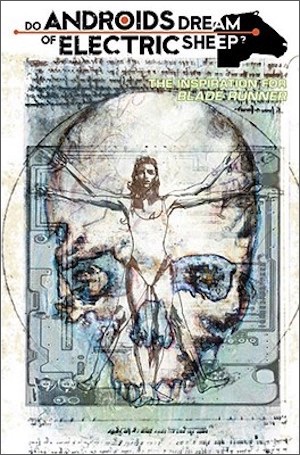
Harrison Ford famously called his third most iconic SF/Fantasy role “a detective who doesn’t do any detecting”. But Deckard, like the movie around him, is not about plot and Ford is playing less a character than the entire concept of the hard-bitten, morally compromised, hard drinking gumshoe. Yes, it’s all about the trenchcoat and the mood and the atmosphere. But what mood. What an atmosphere. What. A. Trenchcoat.
Constable Peter Grant, Ben Aaronovitch’s Rivers of London Series

A young Sierra Leonean/British copper with an aptitude for magic, Grant is recruited into the Folly, the London Met’s unit for dealing with magical crimes. A complete departure from your typical detective archetype, Grant is young, tech-savvy, snarky and genuinely seems to like other human beings(!)
Another thing that sets the series apart is that it doesn’t just show the aspects of policing that fiction tends to focus on i.e., solving crimes. Sure, Grant might face ghosts and body-hopping serial killers, but he also acts as a mediator, brokering peace between the feuding gods of London’s rivers and liaising with other agencies from across the world. Rivers of London takes a whole-cloth approach to depicting the day to day life of a modern British police officer which honestly makes it feel more faithful and realistic than a lot of straight crime fiction.
Ned Stark, George R. R. Martin’s A Song of Ice and Fire series
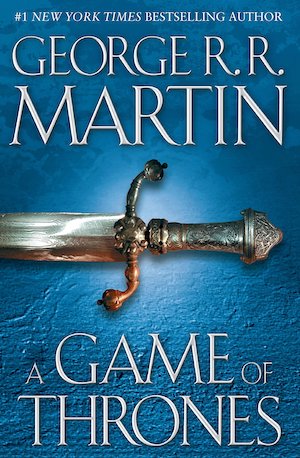
So stop me if you’ve heard this one before. A good man comes to a corrupt city seething with intrigue and betrayal and tries to solve the murder of his old mentor. But, he puts his trust in the one guy who he absolutely should not have trusted and in the end he’s brought down by a beautiful, treacherous blonde with gams that go everywhere, noticeably around her brother’s firm, dewey thighs.
“I ain’t even sorry.”
Yup. Ned Stark is your classic film noir detective trying to solve a hideous crime and ends up exposing corruption that goes all the way to the top, and which is he powerless to stop.
Forget it Ned. It’s King’s Landing.
Dirk Gently, Douglas Adams’ Dirk Gently Novels
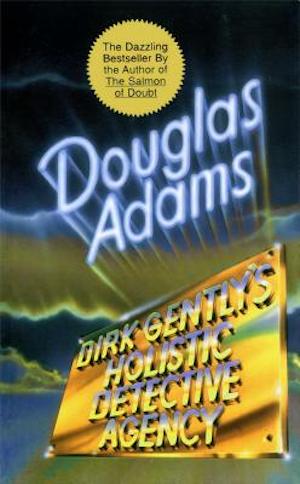
Less a single character and more a concept, Dirk Gently was Adams’ commentary on fictional detectives who rely more on coincidence and always correct guesses than on anything remotely like actual deduction.
Now what’s this doing here? That’s the real mystery.
Dirk believes in the fundamental interconnectedness of all things, and takes a holistic approach to solving his cases, just acting randomly until the universe provides him with a solution. Which it always does For example, when stumped by a particularly vexing mystery Dirk muses that a child could see the solution, asks a random child and gets the correct answer (the perpetrator had a time machine).
It’s a very plastic concept, and probably why Dirk is so radically different across his many adaptations, whether it’s his rather scuzzy, overweight literary version, Harry Enfield’s lovable avuncular Dirk from the radio dramas, Stephen Mangan’s earnest conman from the 2010 series or whatever the hell Samuel Barnett was doing.
Tuvok, Star Trek: Voyager
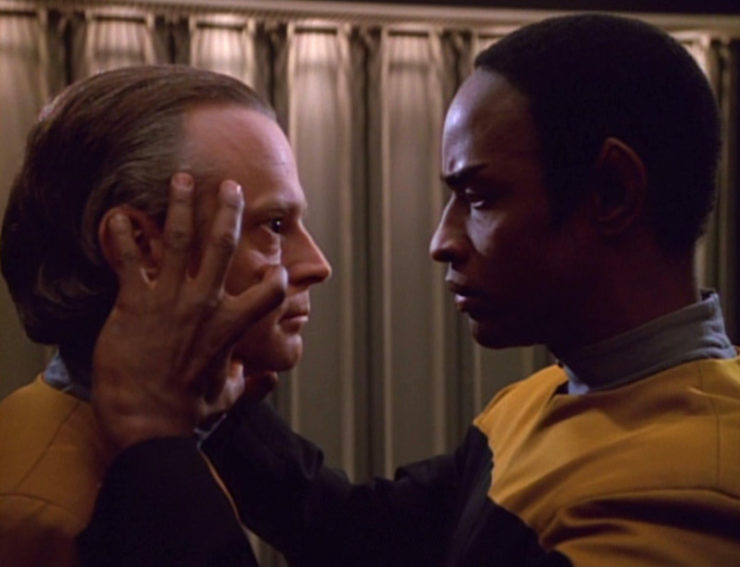
Being the security officer on a Starfleet vessel is a weird job. On the one hand, you’re a bridge officer responsible for the ship’s arsenal which could literally devastate entire civilizations from orbit. On the other hand, you will occasionally be called down to Ten Forward to resolve a drunken dispute arising from the Betazed ambassador getting sloshed and sending telepathic dick pics to the Andorian delegation. You’re basically a bouncer with nuclear codes. Other duties include getting thrown around by whatever insecure monster or space deity wants to make themselves feel like a big man this week and, of course, solving the occasional good old fashioned MURDER.
Tuvok, played by Tim Russ, was the Vulcan security officer on Voyager (also known as Star Trek: Squandered Potential) a show with whom I have a tempestuous love/hate relationship so strong that you’ll frequently find me on the moors in a thunderstorm screaming its name while wearing a nightdress. Emotionless and logical even for a Vulcan, Tuvok was a natural fit for the role of the Sherlock Holmes-esque detective which the show would occasionally put him in with mixed results.
The first was “Ex Post Facto”, where Tuvok has to exonerate Tom Paris for the murder of an elderly alien scientist whose wife he was schtupping. It’s very consciously done like a noir murder mystery, complete with hard-boiled dialogue and character smoking (a rarity in Trek) but it fails to work either as straight drama or camp. It also relies on the hackneyed “the dog didn’t bark” trope to resolve its murder and so doesn’t really establish Tuvok as a competent detective.
Much more successful is “Meld” where Tuvok has a to track a serial killer loose on Voyager, played by the manifestation of the feeling of someone walking on your grave, Brad Dourif. In this episode, Tuvok mind melds with Dourif’s character to give him a measure of emotional control and ends up becoming psychotic, literalising the old “you have to think like the killer” saw. We also learn in this episode that Tuvok knows 94 ways to kill you unarmed, making Neelix’s survivial to the end of the series even more miraculous. Tuvok may be the most fascinating, under-utilised character in Trek to the point that…
Hey? CBS? You know the way you’re greenlighting new Trek series every damn day? Remember NCIS? Picture it: Older, wiser Tuvok (he now knows 104 ways to kill you) travelling across the Federation, solving Starfleet related murders. He served with Sulu, which gives him a connection to the Original Series characters, you could bring back Voyager crew, have him meet up with Seven of Nine—seriously guys, call me, I can have a pitch document ready by the end of the week, call me you cowards.
I looked at the names on my list. Not a bad day’s work. Now, I just had to figure out a way to wrap this all up.
A gun came into my office and made itself comfortable, followed by the shifty looking mustachioed man hanging off the handle.
“My hemployer vishes to speak vith you” he said. “Please to follow me.”
Buy the Book
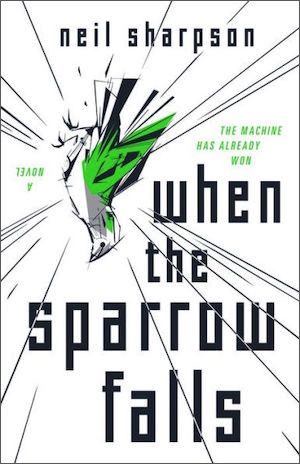

When the Sparrow Falls
Neil Sharpson lives in Dublin with his wife and their two children. Having written for theatre since his teens, Neil transitioned to writing novels in 2017, adapting his own play The Caspian Sea into When The Sparrow Falls.










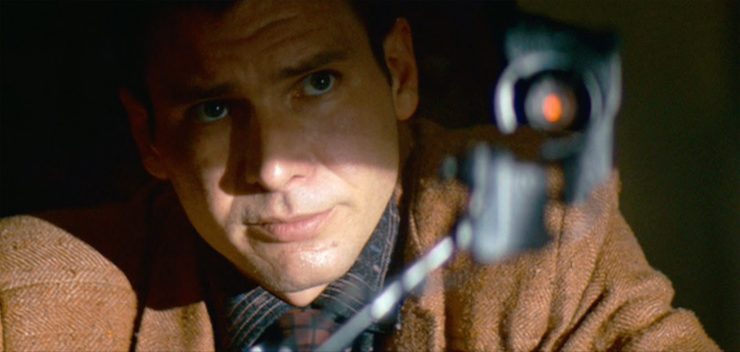
“or whatever the hell Samuel Barnett was doing.”
I would call it “trying very hard to be Matt Smith’s Doctor.” Which, yes, is weird for a character whose book version would look more like Bob Hoskins playing Carl Kolchak.
Elijah Bailey and/or R Daneel Olivaw, the Caves of Steel, etc – Isaac Asimov.
Brawne Lamia, from Dan Simmons amazing Hyperion and The Fall of Hyperion, comes to mind.
Garrett from Glen Cook’s Garrett PI series
Eve Dallas from JD Robb’s In Death series.
All urban fantasies are built on a mystery structure from the private detective to CSI techs to beat cops, but it’s set in a contemporary world with fantasy elements. So, we could be here well in to the night just tossing out UF series.
Karrin Murphy, from the Dresden Files, seems an obvious candidate. Smart, tough and increasingly savvy about complications from the magical world in or adjacent to her home city of Chicago.
Catseye Gomez from Simon Hawke’s wizard series comes to mind.
The Blade Runner sequel gave me a good chuckle when Deckard said he was good at what he did. Not really, mate. You got beat up by everyone you came across!
Randall Garrett’s Lord Darcy! I am not much of a mystery fan, but I adore these.
Sam Vimes and the rest of the Watch
I second Brawne Lamia.
Arkadia Darrell from Asimov’s *Foundation* trilogy is another classic.
Miles Vorkosigan made for a damn good detective when needs must, possibly most notably in Memory but most touchingly in “The Mountains of Mourning”.
Niven’s Gil the ARM is a fine detective (as is the detective in Niven’s “The Meddler”)
Seconding the mention of Glen Cook’s Garrett. While the quality of the novels can be uneven, and arguably declined over time, Sweet Silver Blues and Old Tin Sorrows could stand with Hammett or Chandler’s work.
Miles Vorkosigan!
Hank Palace in “The Last Policeman Trilogy” by Ben H. Winters.
Det. Sgt. Sybil Sue Blue, from Rosel George Brown’s 1966 novel, (Galactic) Sybil Sue Blue, a “lost” classic of the sf New Wave that is coming back into print from Journey Press.
I was going to say Randall Garrett’s Lord Darcy and Larry Niven’s Gil the ARM, two of my favorite SFF detectives, but other people with incredibly good taste have already mentioned them. I’ll happily second them, though.
What about the Shadow and the Batman? They certainly qualify as SFF detectives.
@2/Ian: I second Lije Baley and Daneel Olivaw. I’ve always wanted to see a TV series about them.
@7/RobMRobM: Doesn’t Harry Dresden himself rate a mention? He’s pretty much your archetypal urban-fantasy gritty noir detective.
Jasper fforde’s Thursday Next! Who can solve any mystery but the worm implanted in her mind …
Juliet Marillier’s Blackthorn and Grim, beginning with Dreamer’s Pool
Martha Wells’s Murderbot
All of SFF’s Sherlockians- most recently Crow and Dr. Doyle, from Katherine Addison’s Angel of the Crows.
No one has mentioned Joe Miller from The Expanse yet?
That was much more entertaining than the usual “N books featuring X” article — thank you! (And you didn’t even need to have two men with guns suddenly burst into the room, although I suppose one man with a foreign accent and a gun is coming a bit close.)
YESSS, Yes, SSIS … uhm, SFIS – Starfleet Investigation Service – sounds exactly like something we never knew we always wanted! (Even if it doesn’t work as a whole series, it would make a delightful one off episode; give us a Good Look at the sort of Science Fiction nonsense that makes life as a Starfleet security officer so very, very painful and so very frequently abbreviated with extreme prejudice).
In all truth Mouse – ahem, MISTER SHARPSON, sorry about that – this is an excellent article, with the sole exception that poor old Harry Dresden somehow failed to make the cut (Presumably because dear old Gates of London managed to nip into your Urban Fantasy slot first, presumably because he happens to be a crafty, crafty lad & because he only had to cross the Irish Sea and not the whole broad Atlantic!).
I think I read about this book somewhere here on TOR: the team of Martha and the Dragon, from MacAvoy’s Tea with the Black Dragon.
No-ones mentioned Samuel Vimes???
obviously Nohar Rajasthan from Forests of the Night by S Andrew Swann
Master Li & Number 10 Ox from the excellent Bridge of Birds series by Barry Hughart
Hawk & Fisher from the books by Simon R Green
Detective Inspector Chen from the books by Liz Williams
Greg Mandel from the early SF books by Peter Hamilton
@23 – I pegged Harry as the prototypical SFF Private Investigator rather than the “Detective” listed in the title of the article – but on the merits, of course.
So many options! Vampire Files – Elrod, Forests of the Night – Swann, Automatic Detective – Martinez, Aubrey Knight- Barnes, Fables of Tonight- Resnick. Cal Macdonald, Repairman Jack, Sandman Slim, Joe Pitt, are of a type. California Bones- Eekhout. Pip and Flinx. I guess Darkly Dreaming Dexter is kind of a detective. Many of these veer into protagonists who just stumble into a situation; I guess narrowing it down just reflects your tastes. But it’s fun to recollect these characters.
#31- Took me so long to write, just saw you mentioned Swann. And Number Ten Ox, yes! But I can’t recollect if I read the rest of the series; might have to look that up.
And if conspiracies count, Medusa Uploaded by Devenport was cool.
And now Jessica Jones comes to mind as well.
@32/RobM: I’m not sure how many of the characters mentioned actually have the title “Detective.” Tuvok certainly doesn’t.
Anyway, if Tuvok rates a mention, surely Deep Space Nine‘s Odo is even more worthy, as he was more of an actual police officer rather than a security chief, and he had his share of mystery episodes influenced by everything from Raymond Chandler to Columbo.
Coyote Kings- Faust, and Meddling Kids- Cantero, also cool. This Body’s Not Big Enough for Both of Us by Cantero is more appropriate, but I prefer Kids.
Alternate history; Yiddish Policemen’s Union and Fatherland are interesting too.
Bannerless and Wild Dead from Carrie Vaughn
I love the comments on this one. Tons of great characters and books/series. I’d like to add Kapitänleutnant Franz-Karl Ritter and his various wolf companions of the Werewolves corps from Michael Swanick’s Mongolian Wizard short story series right here on Tor. If you haven’t already read it I strongly recommend them, you’re in for a treat!
In “The Idylls of the Queen” by Phyllis Ann Karr, Sir Kay investigates the murder (by poison) of Sir Patrise at a dinner party given by the Queen.
A show with whom I have a tempestuous love/hate relationship so strong that you’ll frequently find me on the moors in a thunderstorm screaming its name while wearing a nightdress.
Damn but I love that paragraph!

Since we’re doing TV shows the first Blake’s Seven episode I ever saw was Mission to Destiny in which Avon solves a locked room mystery on a spaceship.
@6: All urban fantasies are built on a mystery structure from the private detective to CSI techs to beat cops
Is that what urban fantasy has compressed to? ISTM it didn’t start out that way, e.g. War for the Oaks, or early (at least) de Lint.
In addition to Lije Bailey and Daneel Olivaw, Asimov created Wendell Urth. Doubleday published a whole book, Asimov’s Mysteries, although it stretched the term a bit (e.g., “Marooned off Vesta” is a standard SF tech puzzle, and “Liver of Fat Goose” is a tech puzzle with no solution) to get enough stories for a book.
Lincoln Powell, from Bester’s The Demolished Man.
Several of Lee Killough’s books involve police detection en masse; Nicoll has cited the Brill/Maxwell books, but my favorite is The Deadly Silents, in which Earth police are hired as peacekeepers/intermediaries (bear in mind these books were some decades ago) and then have to figure out why one of them ends up dead.
In Poul Anderson’s “The Queen of Air and Darkness”, PI Eric Sherrinford (the only PI on the planet) admits to having modeled himself on Holmes.
This is right in my wheelhouse! Love me some detectivin’.
“The Devil’s Detective” by Simon Unsworth – Setting: Hell. Protagonist: Detective whose punishment is not being allowed to investigate anything. Until suddenly, there’s a murder that wasn’t authorized by Hell – and he has to find out the truth while avoiding all the traps that Hell lays for the unwary sufferer. The very picture of the world-weary, secretly-fearful gumshoe.
“The Last Policemen” by Ben Winters – A huge meteor is heading for earth, and people are abandoning everything and everyone…except our protagonist, who is still quietly doing his job as the world burns down around his ears. Lovely story about a good man in a terrible situation.
“Johannes Cabal, The Detective” by Jonathan Howard – A decidedly different sort of novel starring his irascible amoral necromancer. Cabal steals the identity of a government official and books a flight on a zeppelin only to discover a locked-room mystery that intrigues him. When his curiosity results in an attempt on his life, he turns his full attention to discovering the murderer. Great mystery, big fun.
“The Automatic Detective” by A. Lee Martinez – a sentient robot detective and a ’40s noir plot, including wisecracking characters, shady dames, and all the rest.
Nicolas Rathe and Philip Eslingen from Melissa Scott’s and Lisa Barnett’s Astreiant series. Nico is a pointsman, basically an early type of policeman, in a Renaissance Low Country analog where magic and astrology work. Philip is an ex-mercenary, now residing in the city.
BZ Gundhalinu, from Joan D. Vinge’s Tiamat novels, would qualify I think.
Steven Brust’s Vlad Taltos, from the fantasy side of things.
October Daye by Seanan McGuire, Thurdsay Next by Jasper Fforde, Harry Dresden by Jim Butcher, Ivy Gamble by Sarah Gailey, Sam Vimes by Terry Pratchett, Rick Deckard by Philip K. Dick… did you really find it hard?
FINCH! FINCH FINCH FINCH FINCH FINCH!
Where are my Vandermeer fans?
Is there any beat rougher than Ambergris? It’s myco noir, is what it is. John Finch isn’t hardboiled, he’s toasted! But he’s clearly a detective, despite his protestations to the contrary.
In the first of Poul Anderson’s Time Patrol stories, Manse Everard encounters a familiar sounding detective:
The inspector from Scotland Yard agreed to let them look at the barrow—“The case is solved, gentlemen, there are no more clues, even if my colleague does not agree, hah, hah!” The private agent smiled sourly and watched with a narrow eye as they approached the mound; he was tall, thin, hawkfaced, and accompanied by a burley, mustached fellow with a lump who seemed to be a kind of amanuensis.
And there’s Chris Shane in John Scalzi’s Lock In and Head On who’s an FBI agent while his consciousness inhabits an artificial robotic body.
Colonel Thomas Bushell of the Royal American Mounted Police in Richard Dreyfuss and Harry Turtledove’s THE TWO GEORGES, and Senior Investigator Khalid al-Zarzisi in Harry’s THROUGH DARKEST EUROPE.
Marid Audran of George Alec Effinger’s When Gravity Fails. Chandler-esque North African cyberpunk.
Howzabout Chief Garibaldi from Babylon 5?
Craig Schaefer’s Daniel Faust and Harmony Black series
Takeshi Kovacs from Richard Morgan’s Altered Carbon seems to qualify.
> Howzabout Chief Garibaldi from Babylon 5?
KUDOS — absolutely!
Frank Compton from the Quadrail series by Timothy Zahn.
I am a longtime reader of whodunits, and I was delighted when I got to the final book in the Murderbot series and found that it was set up and constructed like a traditional murder mystery.
Thara Celehar reprises his gumshoe act from the B-plot of The Goblin Emperor inThe Witness for the Dead, also by Katherine Addison.
Also, if we’re getting into audio drama, detective Juno Steel and plucky secretary/occasional aspiring detective Rita do their share of sci-fi sleuthing in The Penumbra Podcast.
Can I just say I love the setup for the Tuvok spinoff? A much underused character. Could we work Sulu in too? Could we actually get George Takei back in uniform?
Great fun to read! Thanks for this.
I’d add Sunday Azhmundin from Peter Watts’ “The Freeze-Frame Revolution” novella to your list. Pretty bad-ass detective in her own right who gets the job done.
She just takes a hell of a lot longer to solve the mystery!
Wil Brierson from Vernor Vinge’s Marooned in Real Time, a novel length murder mystery
How about Asimov’s Wendell Urth?
Tyador Borlú of the Besźel Extreme Crime Squad, the main character in China Miéville’s *EXCELLENT* novel “The City & The City”
That marvelously creative centaur that goes by Sarah Monette / Katherine Addison has contributed not just one, but THREE memorable SFF gumshoes.
Besides the aforementioned Mer Thara Celehar, who after unmasking a conspiracy that resulted in the death of an emperor in The Goblin Emperor claimed his own book in Witness for the Dead, there is the angelic Holmes version of The Angel of the Crows and (perhaps my personal favorite) Kyle Murchison Booth of The Bone Key.
“played by the manifestation of the feeling of someone walking on your grave, Brad Dourif”
Apparently (totally justifiable) righteous outrage brings out your seriously awe-inspiring way with words! Others have noted great turns of phrase from the Tuvok segment but I had to add this, as it rang in my head – truth tolling! ;-)
Just about any character I could have brought to the discussion has already made an appearance, so I am going to simply subscribe to the thread and watch my TBR list grow LOL
I would hope that Bob Howard, from Charles Stross’s Laundry Files novels, might warrant a mention here.
Thraxas of Turai is an overweight mage academy dropout with a blade and a drinking problem, but he is sharper than an elf’s ear when it comes to detecting.
I see Thraxas has been mentioned as well as Lord Darcy and Asimov’s team. How Bester’s “The Demolished Man” didn’t make the list in the article confuses me. Aside from being a trail blazing book, it’s a good book . It also introduced me to “motive, means, opportunity” and Sardine when I was a kid.
Jack Vance who wrote several mysteries, won an Edgar, before specializing in science fiction, wrote a lot of books with mystery plots. “The Star King” has a fairly long section where Kirth Gersen does a country house on a space ship thing where he catches the shape shifting Attel Malagate.
There is no detective anywhere like Master Li, with his absolutely innocent assistant Number Ten Ox. The China that never was is splendid, moving, intense, insanely funny, gloriously corrupt, and perfect.
“Bridge of Birds”, by Barry Hugheart, deserves its own sixteen-episode Netflix adaptation.
@71
Well, he DOES have a SLIGHT flaw in his character…
String City by Graham Edwards (cyberpunk noir)
&
Garrett P.I. by Glen Cook (excellent world building and characters)
Surprised no one has yet mentioned Jules de Grandin, first published in 1925.
How about EPA (Environmental Perfection Agency) agent David Fisher from Harry Turtledove’s The Case of the Toxic Spell Dump?
Not legally available in English, but I feel that Shoutaro Hidari and Philip from Kamen Rider W deserve a mention. Both a 2-in-1 Detective (okay, technically PI, but the series uses the word “detective,” not sure if it’s a cultural thing) and a 2-in-1 Kamen Rider, it’s a great series for kids, and one of the best Kamen Rider series that’s come out! And yes, Philip was specifically named after Philip Marlowe.
Alex Lomax from Robert Sawyer’s Red Planet Blues!
@76/Neko: I was tempted to mention Shoutaro and Philip! Kamen Rider W is a neat series, a riff on noir detectives where the city itself is one of the main characters. It’s one of the more popular seasons, and they’re actually making an anime sequel series to it based on its spinoff manga, a first for any Kamen Rider series (aside from a few super-deformed comedy specials here and there). I’m also rather fond of Shinnosuke Tomari of Kamen Rider Drive, which took a police-procedural approach and had some cool mysteries.
Is there a distinction between a detective and a PI? I’ve always understood “private investigator” and “private detective” to be synonymous. Anyway, the word they used in W is tantei (探偵), which means a detective or a spy, someone hired to obtain information. A police detective is a keiji, as in Uchuu Keiji Gavan (Space Sheriff Gavan).
@71 – After seeing Jackie Chan as the Drunken Taoist Immortal in FORBIDDEN KINGDOM, I think we’ve found the right person to play Master Li.
In one of his stories Harry Turtledove spoofs one of Dashiell Hammett’s s books.
“Mr. Bowman, that great lumpish creature down there—in that it bears a remarkable resemblance to you, eh?—is an elephant, but not a Maltese elephant, not the Maltese Elephant we have sought so long and so hard.
“How do you know?” Bowman said. “An elephant is an elephant, right?”
“An elephant is an elephant—wrong,” Schlechman answered. “A Maltese elephant is easily distinguished from that gross specimen by the simple fact that a grown bull is but slightly smaller than a Shetland pony.”
“Yeah, and rain makes applesauce,” Bowman said with a scornful laugh. Go peddle your papers.”
[Harry Turtledove, The Maltese Elephant, 1995]
@79.
He’s a bit too fit. I was thinking James Hong: https://www.youtube.com/watch?v=bPWWh7yvReo
Brad Dourif is indeed wonderfully creepy, right up there with Peter Lorre.
For those who don’t know, if you exist, Lord Darcy is an investigator for the Duke of Normandy in a world where magic is a science. It’s also the go to explanation for locked door mysteries and other conundrums. Except Master Sean, the forensic wizard, scans for magical traces and finds none. The answer is never ‘ a wizard did it.’ in fact in one case it is the opposite of a wizard.
vernor vinge’s marooned in realtime
https://www.tor.com/2009/08/07/vernor-vinges-marooned-in-realtime/
jack glass
“This narrative, which I hereby doctorwatson for your benefit, o reader, concerns the greatest mystery of our time. Of course I’m talking about McAuley’s alleged ‘discovery’ of a method of travelling faster than light, and about the murders and betrayals and violence this discovery has occasioned. Because, after all – FTL! We all know it is impossible, we know every one of us that the laws of physics disallow it. But still! And again, this narrative has to do with the greatest mind I have known – the celebrated, or infamous, Jack Glass. The one, the only Jack Glass: detective, teacher, protector and murderer, an individual gifted with extraordinary interpretive powers when it comes to murder because he was so well acquainted with murder. A quantity of blood is spilled in this story, I’m sorry to say; and a good many people die; and there is some politics too. There is danger and fear. Accordingly I have told his tale in the form of a murder mystery; or to be more precise (and at all costs we must be precise) three, connected murder mysteries.”
How about Mike McQuay’s Matthew Swain, “the 21st Century Private Eye” (well, it WAS the early 1980s when this series came out)?
@83: Yes, Marooned in Realtime manages to be a far-future cozy mystery, with the high-techs standing in for the upper class suspects, and the others standing in for the local yeomanry, and the overall situation they’re in standing in for being trapped in an estate by a blizzard or other storm.
Kirth Gersen does a lot of detecting, tracing, following clues and capturing.
The problem is his villains, there isn’t much taking them to the authorities.